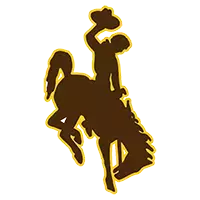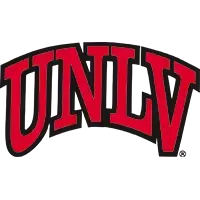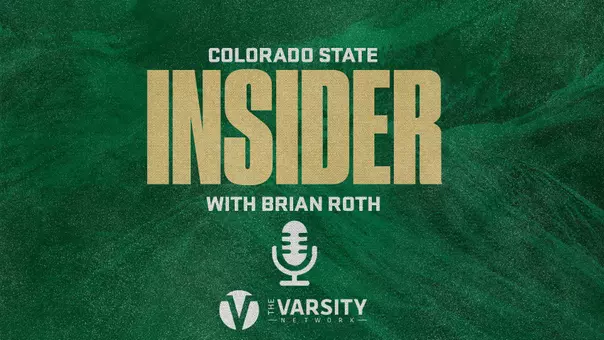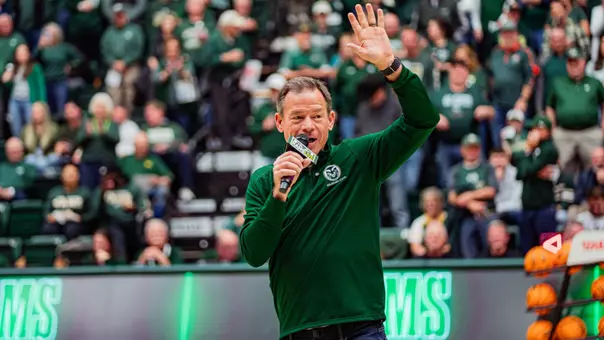Colorado State University Athletics
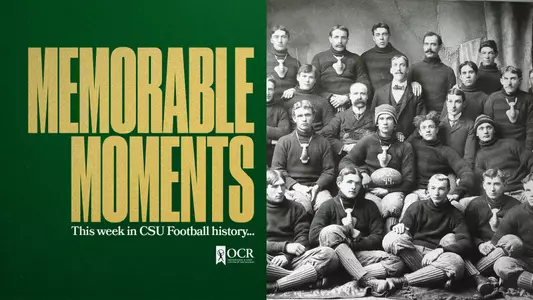
Memorable Moments: The One True Rivalry
11/13/2024 2:00:00 PM | Football
Schools can’t even agree when it officially started
As one of the longest continuous rivalries west of the Mississippi, this week another installment of the Border War game will occur in Fort Collins. Among all the great rivalries CSU has, the Border War game has made or broken more seasons, been played more times than any other school and has one of the best traveling trophies in the nation. These schools have no love lost on one another and it all began from the very first game, a contest CSU does not count in its record.
But why?
Taking you back to 1899, football was more like rugby than the game we know today. There was little oversight, the conference was weak in its governance over schools and rules were not well known. The 1899 season was also the first in Wyoming's history and really, outside of the 1893 seasons and 1894 lone game, the Aggies had not played football either.
The team from Wyoming invited the Aggies to Laramie to play on Thanksgiving Day, November 30, 1899. The Aggies brought their official to act as umpire or referee and their coach, William Forbes, brought his inexperienced team to play the last game of the season.
In 1899, each school had an official who represented the school as either a referee or umpire. They kept the rule book and the time of the game. According to The Fort Collins Express newspaper, the Aggies brought Professor E.B House, a very respected member of the Agricultural College faculty, who acted as the referee in the first half of the game. Throughout the first half, House was surrounded by the Wyoming players and even fans, insulting him with abusive cursing in a way that was new to him. Every decision he made was questioned if it was unfavorable to Wyoming.
The newspaper went on to explain the Wyoming fans would rush in and surround Professor House with canes, waving them and shoving their fists in the air cursing, the referee and shouting "Kill the ______! Kill the whole outfit! Mob them right here!" House then stopped the game to disburse the crowd.
House then took over as the umpire in the second half and the mob of Wyoming fans didn't let up on their behavior. With just two minutes remaining in the game, and the Aggies winning 12-11, Wyoming broke rule No. 17, illegally touching the ball. The Wyoming referee, Mr. E.D. McArthur, then argued with House, who now had the final say on the rule. McArthur then struck the rulebook from House's hand and said, "He did not give a damn about the rules." House immediately declared Wyoming losers by forfeit and the game was over, still with two minutes left to play.
There is even more detail and drama which occurred with this game, such as the Wyoming team lining up with nobody opposing them and scoring a touchdown, declaring themselves winners. In the end, Wyoming admitted their fault and the game showed as a CSU win for many decades on the record books.
Until…
In 2010, following the complete research of Colorado State's football history, athletic department officials reviewed games that should not count in the school's record. For instance, CSU counted some of the high school and military games in the school record -- those were vacated as they were not against colleges or universities. The first two games against Longmont Academy did count, because Longmont Academy was a hybrid college and high school, allowing it to be an official game.
Then three incomplete forfeits were uncovered in the records after the research was completed. The first being the 1899 Wyoming game, the second when the Aggies forfeited to Northern Colorado in 1900 and the third when Fred Folsom protested an Aggies player and CU decided not to play the Aggies at all in 1901. The decision was made by CSU officials that since those three games were either not played or completed, an incomplete game did not count in the record, even if it was a forfeit.
Both CU and UNC had no issues with CSU vacating those games altogether, but Wyoming still counts the 1899 game so they can say they have played CSU in three centuries. Sure, a game was played with crazed fans coming on the field and threatening the life of Aggie players and referees, but to stay consistent with other incomplete game, the 1899 Border War game never happened. However, it did set the pace for what is the Border War game.
Currently, CSU recognizes there was an attempt at a game in 1899, but it was a forfeit and does not count in the record. When will this dispute ever be reconciled? Possibly never, because it makes just one more exceptional story in the finest border war game in US history. One where mascots have been stolen, fields have been burned with school letters and some of the greatest games in both school's history have been played.
But why?
Taking you back to 1899, football was more like rugby than the game we know today. There was little oversight, the conference was weak in its governance over schools and rules were not well known. The 1899 season was also the first in Wyoming's history and really, outside of the 1893 seasons and 1894 lone game, the Aggies had not played football either.
The team from Wyoming invited the Aggies to Laramie to play on Thanksgiving Day, November 30, 1899. The Aggies brought their official to act as umpire or referee and their coach, William Forbes, brought his inexperienced team to play the last game of the season.
In 1899, each school had an official who represented the school as either a referee or umpire. They kept the rule book and the time of the game. According to The Fort Collins Express newspaper, the Aggies brought Professor E.B House, a very respected member of the Agricultural College faculty, who acted as the referee in the first half of the game. Throughout the first half, House was surrounded by the Wyoming players and even fans, insulting him with abusive cursing in a way that was new to him. Every decision he made was questioned if it was unfavorable to Wyoming.
The newspaper went on to explain the Wyoming fans would rush in and surround Professor House with canes, waving them and shoving their fists in the air cursing, the referee and shouting "Kill the ______! Kill the whole outfit! Mob them right here!" House then stopped the game to disburse the crowd.
House then took over as the umpire in the second half and the mob of Wyoming fans didn't let up on their behavior. With just two minutes remaining in the game, and the Aggies winning 12-11, Wyoming broke rule No. 17, illegally touching the ball. The Wyoming referee, Mr. E.D. McArthur, then argued with House, who now had the final say on the rule. McArthur then struck the rulebook from House's hand and said, "He did not give a damn about the rules." House immediately declared Wyoming losers by forfeit and the game was over, still with two minutes left to play.
There is even more detail and drama which occurred with this game, such as the Wyoming team lining up with nobody opposing them and scoring a touchdown, declaring themselves winners. In the end, Wyoming admitted their fault and the game showed as a CSU win for many decades on the record books.
Until…
In 2010, following the complete research of Colorado State's football history, athletic department officials reviewed games that should not count in the school's record. For instance, CSU counted some of the high school and military games in the school record -- those were vacated as they were not against colleges or universities. The first two games against Longmont Academy did count, because Longmont Academy was a hybrid college and high school, allowing it to be an official game.
Then three incomplete forfeits were uncovered in the records after the research was completed. The first being the 1899 Wyoming game, the second when the Aggies forfeited to Northern Colorado in 1900 and the third when Fred Folsom protested an Aggies player and CU decided not to play the Aggies at all in 1901. The decision was made by CSU officials that since those three games were either not played or completed, an incomplete game did not count in the record, even if it was a forfeit.
Both CU and UNC had no issues with CSU vacating those games altogether, but Wyoming still counts the 1899 game so they can say they have played CSU in three centuries. Sure, a game was played with crazed fans coming on the field and threatening the life of Aggie players and referees, but to stay consistent with other incomplete game, the 1899 Border War game never happened. However, it did set the pace for what is the Border War game.
Currently, CSU recognizes there was an attempt at a game in 1899, but it was a forfeit and does not count in the record. When will this dispute ever be reconciled? Possibly never, because it makes just one more exceptional story in the finest border war game in US history. One where mascots have been stolen, fields have been burned with school letters and some of the greatest games in both school's history have been played.
Rams Live Exclusive: Ram Rush and In State Recruiting with Alex Collins
Thursday, January 29
Rams Live: David Anderson
Monday, December 08
Colorado State Football: Jim Mora Press Conference
Saturday, December 06
Rams Live Exclusive: Head Coach Jim Mora
Tuesday, December 02

